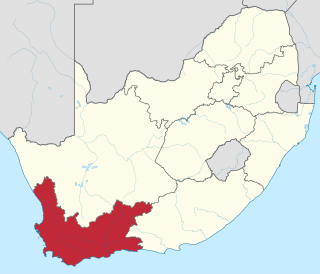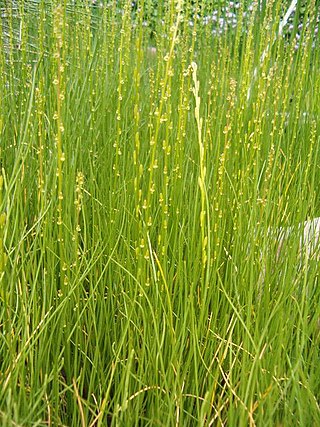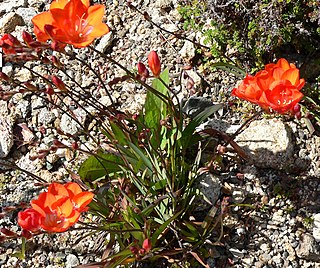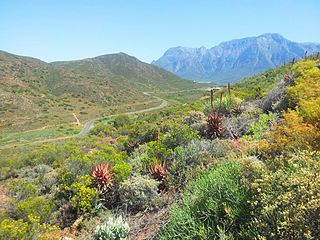
The Western Cape is a province of South Africa, situated on the south-western coast of the country. It is the fourth largest of the nine provinces with an area of 129,449 square kilometres (49,981 sq mi), and the third most populous, with an estimated 7 million inhabitants in 2020. About two-thirds of these inhabitants live in the metropolitan area of Cape Town, which is also the provincial capital. The Western Cape was created in 1994 from part of the former Cape Province. The two largest cities are Cape Town and George.

Hoodia is a genus of flowering plants in the family Apocynaceae, under the subfamily Asclepiadoideae, native to Southern Africa.

Dietes is a genus of rhizomatous plants of the family Iridaceae, first described as a genus in 1866. Common names include wood iris, fortnight lily, African iris, Japanese iris and butterfly iris, each of which may be used differently in different regions for one or more of the six species within the genus.

Triglochin is a plant genus in the family Juncaginaceae described by Carl Linnaeus in 1753. It includes 25 known species. It is very nearly cosmopolitan in distribution, with species on every continent except Antarctica. North America has four accepted species, two of which can also be found in Europe: Triglochin palustris and Triglochin maritima. Australia has many more.

Ehrharta is a genus of plants in the grass family.

The Cape cobra, also called the yellow cobra, is a moderate-sized, highly venomous species of cobra inhabiting a wide variety of biomes across southern Africa, including arid savanna, fynbos, bushveld, desert, and semidesert regions.

Bulbinella is a genus of plants in the family Asphodelaceae, subfamily Asphodeloideae, first described as a genus in 1843. Many species are endemic to Cape Province in western South Africa, confined to the winter rainfall area. Other species are endemic to New Zealand, where they are most common in the central Otago region which enjoys a similar climate to the Cape Region of South Africa.

Gasteria is a genus of succulent plants, native to South Africa and the far south-west corner of Namibia.

The Cape galaxias is a species of freshwater fish of the family Galaxiidae.

Duvalia is a succulent plant genus in the subfamily Asclepiadoideae, in the family Apocynaceae (dogbane).

The Drakensberg siskin is a small passerine bird in the finch family. It is an endemic resident breeder in the eastern Cape Province Transkei and western Natal in South Africa, and in Lesotho.

Tritonia is a genus of flowering plants in the iris family first described as a genus in 1802. They are naturally distributed across southern Africa, with a high concentration of species in Cape Province of western South Africa. The genus is closely related to the genus Ixia.

The blue-mantled crested flycatcher or African crested flycatcher is a species of bird in the family Monarchidae found in eastern and south-eastern Africa.

Strumaria is a genus of African plants in Amaryllis family, subfamily Amaryllidoideae. The genus is known in nature only from South Africa, Lesotho and Namibia. Almost all species flower in the autumn and are cultivated as ornamental bulbous plants.

Wurmbea is a genus of perennial herbs in the family Colchicaceae, native to Africa and Australia. There are about 50 species, with about half endemic to each continent.

Chrysoritis nigricans, the dark opal, is a butterfly of the family Lycaenidae found only in South Africa.

Stapeliopsis is a genus of succulent plants in the family Apocynaceae, native to southern Africa.
Aspidoglossum is a genus of plants in the family Apocynaceae, first described as a genus in 1838. It is native to Africa.

Piaranthus is a succulent plant genus in the subfamily Asclepiadoideae, in the family Apocynaceae.

Robertson Karoo is a semi-arid vegetation type, restricted to sections of the Breede River Valley, Western Cape Province, South Africa. It is a subtype of Succulent Karoo and is characterised by the dominance of succulent plant species, and by several endemic plants and animals.


















